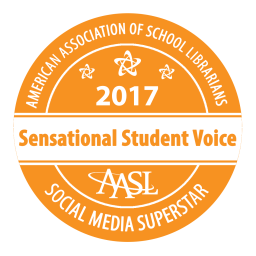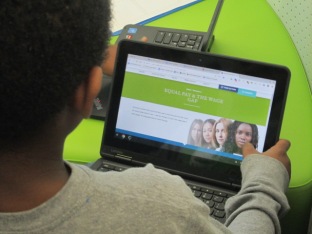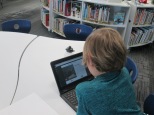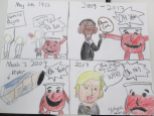
There’s a lot going on in the world right now and it’s easy to get overwhelmed by the many current issues being debated and decided on in our country and around the world. As a teacher librarian, it’s challenging because I want to support all students and families knowing that I might not personally agree with their perspectives. I make sure that I step back and listen to the students, support their research and perspectives, and check my own beliefs.
Recently, Ms. Olin, 5th grade social studies teacher, came to me with an idea. She wanted to get students thinking about current US & World issues and considering what their own perspectives were based on the facts of the issues. She also wanted them to know that their voices mattered in the world and that they could get their thoughts out to local, state, and national representatives as well as the general public to have an influence on decisions being made.
Ms. Olin started this project in her classroom by sharing the book I Have a Right to Be a Child by Alain Serres. This sparked discussion about basic human rights and current issues in the world. She also shared news sites with them so that they could start reading current articles about various trending topics, especially if they weren’t familiar with the current topics being debated. Through these sites, students began to choose a topic that they were interested in, curious about, or passionate for. Sites included Newsela, CNN Student News, PBS News Hour, and Time for Kids.
After two days of exploring, students selected their topic.
In the library, we focused on the importance of raising our voices when we have concerns. I read excerpts from Be A Changemaker by Laurie Ann Thompson.

“Don’t wait. Don’t wait to be powerful, to change the lives and communities around you significantly.”
I also read excerpts from It’s Your World by Chelsea Clinton.

“We can–and should–respectfully disagree with others who have reached different answers from ours” and “Even if we disagree with one another, it’s important to recognize what the facts are”.
Ms. Olin and I both encouraged students to look at issues from all sides and to gather as many facts as possible. With those facts, they could form their own opinions on the issues and brainstorm some possible actions they hope are taken.
We took some time to look at the Letters to the Next President project to see letters that were written by students from many location about a variety of topics. Students could sort the letters by their own topic and see what other students were saying.
As students looked at example opinions and continued to gather facts, they started filling out organizers to get their own thoughts together. In class, they began writing letters, protest signs, and editorial cartoons to express the facts and their own views.
Finally, students came to the library to begin sharing their voice. We spent some time talking about how we can make our voice visible. We could of course mail the letters and artwork to their intended recipients, but how else could we share our voice? I was able to talk to the students about my recent recognition as an AASL Social Media Superstar for Sensational Student Voice and how social media and collaborative tools like Flipgrid allow us to spread our voices to an even larger audience.

We hope our voices are heard by our local, state, and national representatives, but even if they aren’t, we can share our voices with others and offer perspectives and actions that might encourage them to support our cause or make the world a better place. As students finished their work, they recorded their voices in a Flipgrid so that others can consider their perspectives and possibly join their collective voice.
We hope you will take time to listen to each student. If one of the voices speaks to you, give them a response. Better yet, if they inspire you, consider writing your own letter and adding your voice to our grid. We invite your students to join our voices as well.
As we were closing our time in the library, some of the students spoke up and said, “I bet Mr. Trump won’t even read our letters.” This was a great opportunity for Ms Olin and I to repeatedly say to the students, “Your voice matters”. We talked about collective voice, and how sometimes a single voice isn’t heard by someone like the president. However, that single voice can inspire other voices who come together collectively around a common cause. This was a great closing because even as an adult I sometimes wonder why I should even take time to call or write my representatives. However, I was reminded that our individual voices do matter and collectively they make impact.

















Feel free to share with your students that this blog post helped an editor out with a new book series!
This is amazing! I always love these nuggets of information that you share. Thank you.
You continue to amaze and inspire me! I’m preparing to retire as teacher-librarian, but reading your blog makes me wish I was 10 years younger! Good for you as you can explore and expect the miraculous in your students and your profession!
Thank you so much for taking time to read the blog. I’m so glad that it continues to inspire you, even as you near retirement. Congratulations!
I am going to share with my class of future librarians. Thank you for working with children Craig. They deserve the best, and you are providing the best teaching.
Thank you for working with children Andy. Apologies for fuzzy brain on a Sunday AM.
I’m so glad you enjoyed the post and thank you for sharing it with others.
[…] years ago, Ms. Shelley Olin and I collaborated on a student voice project at the very end of the year. Students picked current news topics that mattered to them, researched […]